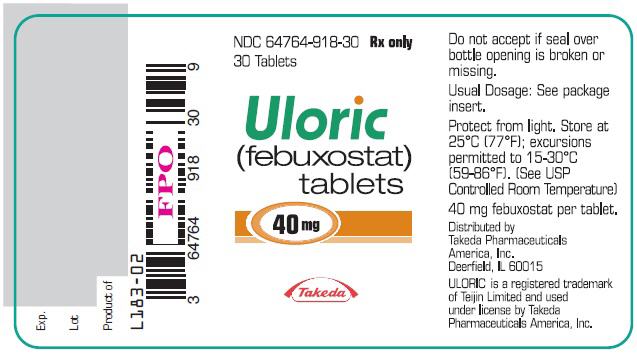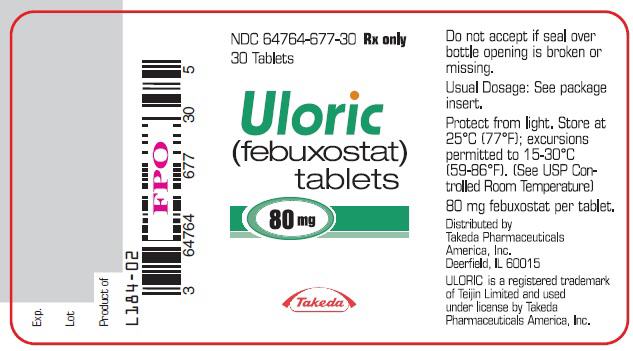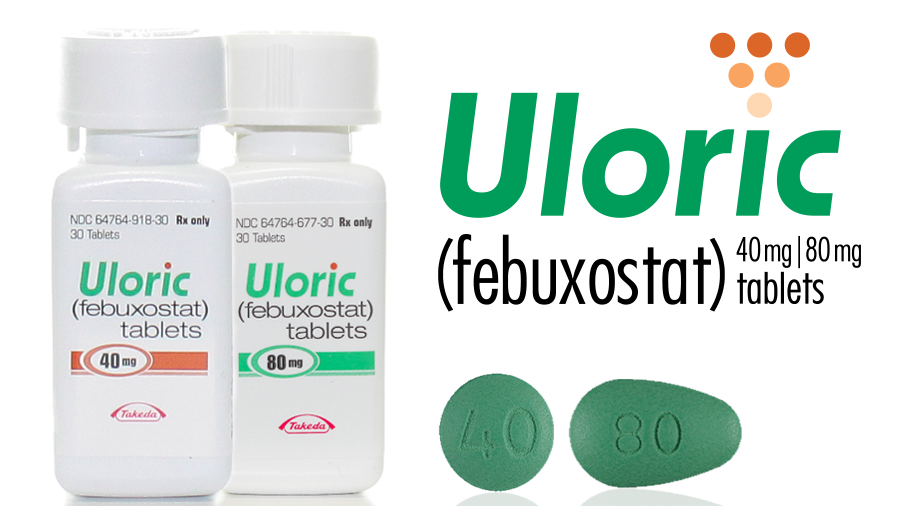Written by Katie Hanna
Uloric, or febuxostat, is a prescription medication belonging to the xanthine oxidase inhibitor drug class. This drug class works by reducing the production of uric acid in the body and is primarily prescribed to patients suffering from gout and/or kidney stones.
Uloric was initially created by TAP Pharmaceutical Products- a joint venture between Takeda Pharmaceuticals and Abbott Laboratories which would later dissolve in 2008. Uloric was later approved by the Food and Drug Administration (FDA) in 2009 to treat gout, a chronic condition that affects 8.3 million adults in the United States.
However, the approval did not come without significant hesitation on the part of the FDA and the Department of Health and Human Services (HHS). In fact, the FDA rejected Uloric twice before it’s final approval because of its serious reported cardiovascular side effects.


In 2005, the HHS replied to a request from Ulorics manufacturer TAP Pharmaceutical Products, for approval of the drug. They requested “further data to clarify the cardiovascular risks” and/or “provide data on the safety and efficacy” of the drug. An FDA expert panel stated that Uloric was the first gout medication to be approved in 40 years despite clinical trials which showed a higher rate of myocardial infarction, stroke and heart-related death associated with the drug.
So, the obvious question here is why Uloric was given approval before it’s safety was proven with clinical trials. Dr. Michael Carome, director of the Public Citizen’s Health Research Group, stated in an interview, “Before the FDA approved febuxostat, there was troubling evidence strongly suggesting that the medication increased the risk of serious adverse cardiovascular events and death, and the agency should have demanded that an appropriately designed clinical trial to assess febuxostats cardiovascular risks be conducted before, not after approval.”
Since its approval, Uloric has been a sales success for Takeda pharmaceuticals who reported $1.9 billion in sales of febuxostat from 2012 to 2017. In 2015, it became the 46th most prescribed brand-name medication in the USA. But is the success worth the danger that patients may have been put in and the potential for legal ramifications for Takeda? Maybe not.
In the decade since it’s approval by the FDA, little has been done to properly educate the hundreds of thousands of patients taking Uloric on the risks involved in using it, according to a report by The Pharma Letter.
In November 2017, the FDA issued a warning to the public stating that “preliminary results from a safety clinical trial show an increased risk of heart-related death with febuxostat (Uloric)” and that they would be conducting a comprehensive review after they received final outcomes from the study.
In 2018, the FDA began a review of the safety clinical trial whose main outcome showed a combination of heart-related death, non-deadly myocardial infarction and non-deadly stroke in its 6000 patient study.
In short, patients with gout who also have pre-existing heart disease face an increased risk of death if treated with febuxostat. Specifically, the risk of death was 34% higher with febuxostat as opposed to the alternative drug, allopurinol. In a statement made to Reuters Health, chief author Dr. William White of the University of Connecticut School of Medicine stated, “The results are entirely unexpected and we don’t have a mechanistic explanation for them.”
It should be noted that 45% of patients in the study discontinued febuxostat before the end of the study and overall, more patients died AFTER stopping their assigned study drug than while taking it.
In January 2019, Takeda announced that it had met with the Arthritis Advisory Committee and the Drug Safety and Risk Management Advisory Committee to discuss the “Cardiovascular Safety of Febuxostat and Allopurinol in Patients with Gout and Cardiovascular Morbidities (CARES)” results. In a vote of 19 to 2, with 1 abstention, they found that the use of febuxostat was favorable for treatment of hyperuricemia in patients with gout.
In the following February, the FDA announced both the requirement of a boxed warning, their most prominent warning, on the packaging of Uloric as well as a new patient Medication Guide to be administered to patients. In addition, they stated they would be “limiting the approved use of Uloric” to patients who had not received effective treatment with allopurinol or experienced severe side effects while using it. In this way, Uloric will be a “last resort” medication only for patients who meet certain criteria and who have been properly informed of the risks involved in taking it.
The FDA concluded that there was, in fact, an increased risk of death for patients who use Uloric when compared to its predecessor, allopurinol. In a statement, a representative for the FDA cited that “This conclusion is based on our in-depth review of results from a safety clinical trial that found an increased risk of heart-related death and death from all causes with Uloric.”
A citizen petition was submitted to the FDA in 2018 calling for the removal of Uloric (febuxostat) from the market. In the petition, the citizen stated that there was, “overwhelming evidence that the serious cardiovascular harms of febuxostat outweigh any purported clinical benefit.” They went on to say that letting it remain on the market ensures “further preventable harm” to patients. However, it did not change the decision of the FDA and febuxostat remains on the market today.
While the citizen petition went unheeded, it has been given more severe warnings and was downgraded to an alternative treatment. It is unknown yet, whether legal claims will materialize regarding the publicity Uloric was given prior to the completion of safety trials that appropriately determined its risk.
And there is a bigger question we must ask ourselves with stories like this one: Why do we keep seeing these pharmaceutical giants sidestepping protocol at the expense of unnecessary patient risk? And with their enormous bank accounts, is there a way to be sure they are made responsible and take an ethical path in the future?
Resources:
Takeda. (2004). Phase 3, Febuxostat, Allopurinol and Placebo-Controlled Study in Gout Subjects (APEX) (Clinicaltrials.gov Identifier NCT00174915). Retrieved from https://clinicaltrials.gov/ct2/show/NCT00174915
Takeda. (2004). Febuxostat Versus Allopurinol Control Trial in Subjects with Gout (FACT) (Clinicaltrials.gov Identifier NCT00102440). Retrieved from
https://clinicaltrials.gov/ct2/show/NCT00102440
White, W. M.D., Saag, K. M.D., & Becker, M. M.D., et al. (2018). Cardiovascular Safety of Febuxostat or Allopurinol in Patients with Gout. The New England Journal of Medicine. Retrieved from https://www.nejm.org/doi/full/10.1056/NEJMoa1710895

Katie Terrell Hanna
Katie Terrell Hanna is a professional freelance writer and consultant. She developed an interest in litigation journalism after an internship at the Office of State Attorney in the 15th Judicial Circuit of Palm Beach County, Florida. She is also a graduate of the Center for Pre-Law/Law Related Careers at the Gerald A. Williams Center for Pre-Law in West Palm Beach, Florida and was inducted into the Law Honor Society of her graduating class.

Get A Free UloricCase Review
If you or someone you love has experienced health complications, including possible cardiovascular issues, while taking Uloric, you may have legal recourse to recover damages.


